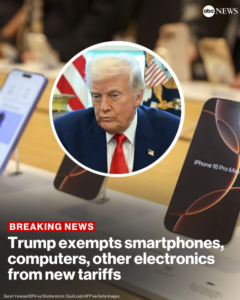In a significant development in U.S. trade policy, President Donald Trump has temporarily exempted smartphones, laptops, and semiconductor components from the newly imposed 125% reciprocal tariffs on Chinese imports. This move offers short-term relief to consumers and major tech companies like Apple, Dell, and Nvidia, which heavily rely on Chinese manufacturing. The exemption also includes semiconductor-making machines, monitors, tablets, and devices like the Apple Watch, collectively impacting about $100 billion in U.S. imports from China
However, this reprieve may be short-lived. Commerce Secretary Howard Lutnick announced plans for separate tariffs targeting these exempted electronics, including semiconductors and pharmaceuticals, within the next two months. These forthcoming levies aim to bolster domestic production for national security reasons .
President Trump has indicated that tariffs on foreign-made computer chips will start at 25% and could increase over time. This strategy is intended to encourage the semiconductor industry to relocate manufacturing to the U.S. However, experts warn that building new chip factories domestically is a complex, costly, and time-consuming process, potentially leading to increased prices for a wide range of electronics
The administration’s fluctuating tariff policies have unsettled markets, with the S&P 500 down over 10% since Trump’s inauguration. Critics, including investor Bill Ackman and Senator Elizabeth Warren, have called for a pause or restructuring of the tariff approach to mitigate economic harm .
While the temporary exemptions provide immediate relief, the looming sector-specific tariffs introduce uncertainty for consumers and the tech industry. The administration’s approach underscores a broader strategy to reshape global supply chains and reduce reliance on foreign manufacturing, particularly in critical sectors like technology and pharmaceuticals.

